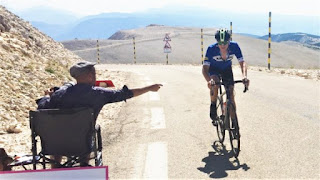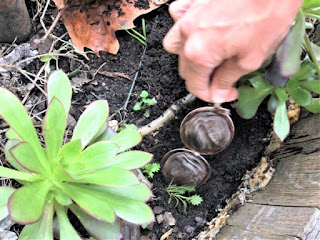Travelling in Croatia
How Can One Adapt Your 5R Philosophy To Travel?
Whether we’re home or away, our efforts focus on my first 3 R’s, since they prevent waste (i.e, those items meant for the landfill and those that are recyclable).
Refuse : Refusing allows you to curb the demand for (and therefore the creation of) products that are needless and waste natural resources. While travelling, it is easy to refuse free promotional goods (such as those offered in festivals), samples (individual soaps, shampoo and lotion containers in hotels, see Reuse), flyers (such as restaurant ads handed out on the street), restaurant disposables (paper napkins and placemats, straws, sugar packets etc.
Leo refusing a business card as he climbs Mont Ventoux, France
Reduce: The voluntary simplicity that we adopted thanks to this lifestyle allowed us to declutter our lives: furniture, personal items, and wardrobes (each one fits in a carry-on). This minimalism translates into many advantages in term of travelling.
- Since we own little, we can easily rent our home; its rental pays for weekend getaways and vacations.
- We do not need to agonize about what to pack… Since it all fits in a carry-on, we can take it all! (see my tips on how to reduce your wardrobe in my book )
- Traveling with a a carry-on eliminates the cost and the non-recyclable sticker created when checking in luggage, makes travelling easy, and minimizes time spent at the airport (no need to wait at the checking counter or luggage claim, no worries of the airline loosing your luggage). With a smartphone, no need to print your boarding pass either.
See my capsule wardrobe
Reuse: After refusing and reducing, reusing is your last chance to prevent waste. Every time I travel, I carry a cloth bag (to buy a croissant and avoid its paper wrapper), a handkerchief (to wipe mouth and hands and avoid paper towels) and a stainless thermos.
(to buy a croissant and avoid its paper wrapper), a handkerchief (to wipe mouth and hands and avoid paper towels) and a stainless thermos.
My vanity case contains a spice shaker filled with baking soda (which I use as tooth powder and deodorant) and a bar of soap (which I use as shampoo and body/facial cleanser).
If I travel by plane for any length of time: I eat before boarding (I refuse the flight’s meal) and carry a sandwich and/or croissant in my cloth bag; I use my phone’s ear buds (instead of those offered on the flight) and my wrap which I use as a blanket (instead of the airline’s, which is wrapped in plastic). The flight attendant fills my container with my choice of drink. Once there, we choose restaurants that offer washable utensils, if we rent an accommodation, we use the available reusable containers in the rental to buy in bulk. I created a Bulk Finder to locate and share locations anywhere in the world. If my app does not point a local bulk location, we automatically fall back on farmer’s markets and health food stores, since they universally offer package-free foods.
See what I pack with me when I travel
Recycle: The 5R’s are to be applied in order, therefore, once you have refused, then reduced, then reused as much as possible, then there is little (if anything) left to recycle. Recycling is only of interest to us if bulk locations are nowhere to be found (which is rare), in which case we inquire about the local policies and purchase our food accordingly.
Rot (Compost): Many cities in the world are now collecting compostable materials (I even found some receptacles on beaches in Mexico), but if we do not have access to compost for our fruit and veggie scraps, we bury them in the ground. If I find myself with an apple core at the airport (an apple being a great easy-to-get snack on the go), I bury it in a plant -although I’ve found that locating a live plant in an airport is no easy task… I am considering building an app to locate those too
Burying the loose tea from my tea ball in a planter in Germany
Many Organizations Provide Carbon Credits To Travelers: What’s Your Take On The Subject? Do You Use Them?
Carbon credits should not give us a reason to travel more or irresponsibly. It is more important and efficient to travel less and travel smart (for example, by train when possible). I sometimes buy them, but travel outfitters now include them more and more (it should be the norm). Plus carbon credits to me are like recycling, once it’s off your hands, it’s out of your control. If I do travel, I believe I have more impact ofsetting my carbon footprint by picking up litter, answering media interviews or giving talks on waste-free living to grow the movement further.
Filling up a found trash bag with litter in the mangroves in New Caledonia
What’s Your Method To Get Water On The Road (TheSteripen, Iode Capsules, Local Water, Etc.)?
A few years ago, I went to Argentina and Chile with a group. The organizers of that trip recommended for us to drink bottled water. I noticed that our guide drank water from the tap, so I did too and did not have any problems. Once on the expedition boat for Cape Horn, he switched to bottled water, so I switched to tea. I believe that besides the fear of getting sick, many tourists also drink bottled water simply for the lack of carrying their own reusable container. It is up to each one to inquire about the potability of local water (see if the dangers are real), but also to remember to bring a reusable bottle along. If you open your eyes for filtered water fountains (or kettles in hotel rooms), you’ll see them everywhere.
See my experience in Asia
Refilling with filtered water at the airport in Chennai, India
What Do You Suggest We Do In Countries Where Recycling Is Not Available ?
Do not let the lack of recycling receptacles let you assume that it is non-existent. Inquire about it because in many countries, such as Brazil, the separation of recyclable materials is actually done at the landfill, by “pickers”, and in Vietnam, by individuals. That said, as I mention above, Zero Waste luckily does not rely on recycling, but my first 3 R’s, which eliminate the need to recycle anything at all.
What Do You Do With Your Leftovers When Traveling?
Whether we treat ourselves to a dinner out at home or while travelling, we do not have leftovers. We have learned to order just what we need and prefer to place a new order if we underestimated our hunger. If bread is left in the basket, which is more the case, I wrap it in the cloth bag mentioned above for a snack, unless we run into some ducks;)
Practicalities put aside, what makes our trips different from before is that we #Collectmomentsnothing and that ultimately is what makes our travels so much more memorable!
Having some fun in Auckland, New Zealand






